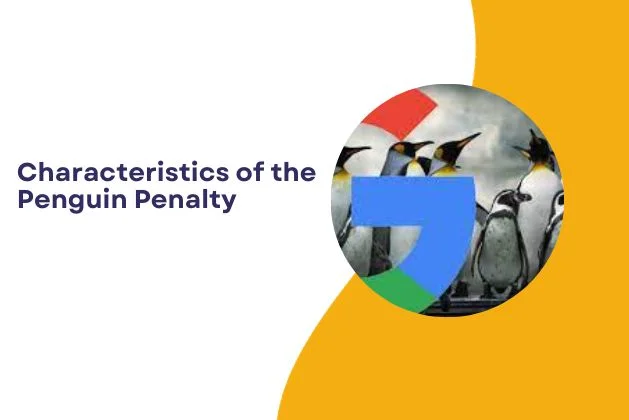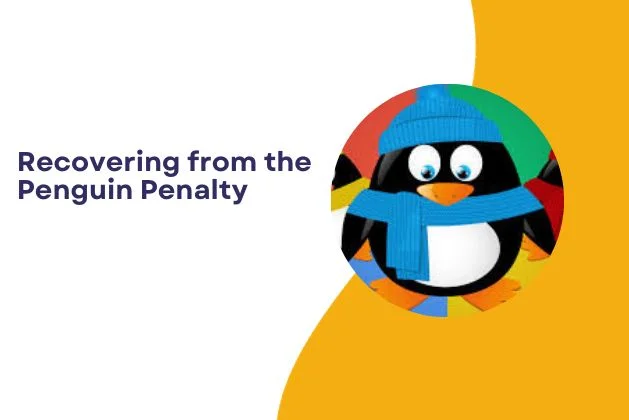Table of Contents
ToggleIntroduction
Navigating the complex world of Search Engine Optimization (SEO) penguin penalty is no easy feat for website owners and digital marketers.
In this constantly evolving landscape, they are often faced with a multitude of challenges and pitfalls that can greatly impact their online visibility. One such challenge that strikes fear into the hearts of many is the infamous “Penguin Penalty.”
This penalty, implemented by Google’s algorithm update in 2012, specifically targets websites that engage in unethical or spammy SEO practices.
The Penguin Penalty is essentially a form of punishment for websites that have violated Google’s guidelines by using manipulative tactics to artificially boost their search rankings.
These tactics can include keyword stuffing, buying links, and creating low-quality content.
When a website is hit with this penalty, it experiences a significant drop in its search rankings, resulting in decreased visibility and potentially devastating consequences for its traffic and business.
Also Read: Digital Unicorn
Understanding the Penguin Algorithm

In April 2012, tech giant Google unveiled their highly anticipated Penguin algorithm.
This powerful tool was specifically created to combat websites that utilize manipulative tactics in their link-building strategies.
By doing so, Penguin aims to penalize these sites and promote the display of high-quality, relevant content in search results.
The primary objective of Penguin is to uphold the integrity and credibility of search engine rankings by cracking down on deceptive practices that artificially inflate a website’s position.
This includes spammy and unethical link schemes, such as buying or exchanging links, using hidden links or text, and participating in link farms.
With its sophisticated algorithms and continuous updates, Penguin is constantly evolving to effectively identify and penalize websites that violate its guidelines.
This ensures that only reputable and trustworthy websites are rewarded with higher rankings in search results.
Characteristics of the Penguin Penalty

Unnatural Link Profiles:
The Penguin Penalty is a specific algorithm created by Google that is designed to identify and penalize websites with unnatural link profiles.
This refers to the use of backlinks that are considered spammy or irrelevant, typically obtained through shady tactics such as link schemes, link exchanges, or paid links.
In simpler terms, this means that websites caught using these tactics to artificially boost their search engine rankings will face consequences from Google.
These tactics go against Google’s guidelines for creating high-quality and relevant content, and are seen as attempts to manipulate their algorithms.
Some examples of spammy backlinks include ones from low-quality or irrelevant websites, excessive use of anchor text (the clickable text within a hyperlink), or links that are not editorially given but rather bought or exchanged.
In essence, the Penguin Penalty serves as a warning to website owners and marketers to focus on creating valuable and authoritative content rather than resorting to underhanded tactics for quick SEO gains.
Keyword Stuffing:
Websites that engage in the unethical practice of keyword stuffing, often with the intention of artificially boosting their ranking on search engines, are at risk of facing repercussions in the form of the Penguin Penalty.
This penalty, implemented by Google to combat spammy and low-quality content, targets websites that try to manipulate their way to the top of search results by excessively repeating keywords in their content.
By doing so, these websites not only violate search engine guidelines but also compromise the user experience by delivering irrelevant and low-quality content.
The Penguin Penalty serves as a deterrent against such deceptive tactics and promotes fair competition in the online realm.
Over-Optimized Anchor Text:
The Penguin algorithm, used by search engines to penalize websites for manipulative tactics, closely examines websites that have over-optimized anchor text.
This refers to the use of an excessive amount of keyword-rich text in the hyperlinks on a webpage.
Such a practice is particularly frowned upon when the anchor text is consistently targeted towards specific keywords.
This is viewed as a deliberate attempt to manipulate search engine rankings in order to gain an unfair advantage over other websites.
By heavily relying on keyword-rich anchor text, these websites are essentially trying to trick search engines into ranking them higher in search results, rather than earning their ranking through quality and relevance of content.
Therefore, Penguin keeps a close watch on such websites and takes strict action against those found guilty of this unethical practice.
Low-Quality Content:
Although not the central concern of Penguin, it is worth noting that low-quality content can still have a significant impact on a website’s vulnerability.
This vulnerability may arise from various factors such as irrelevant, thin, or poorly written content.
A website with such content is likely to face greater challenges in recovering from the penalty inflicted by Penguin.
This is because search engines prioritize high-quality and relevant content for their users, and websites with subpar content are less likely to rank well in search results.
As a result, they may be more susceptible to penalties and struggle to regain their previous ranking and traffic levels.
Thus, it is crucial for websites to maintain high standards of content quality to avoid any negative consequences on their online presence.
Navigating the Penguin-Infested Waters

Audit and Disavow:
Conduct a thorough link audit to identify and disavow spammy or irrelevant backlinks. Utilize Google’s Disavow Tool to communicate to the search engine that you disown certain links pointing to your site.
Natural Link Building:
Focus on building high-quality, natural backlinks. Engage in content marketing, guest posting, and other ethical link-building practices to earn links from reputable sources within your industry.
Optimize Anchor Text:
Diversify your anchor text and use it naturally within your content. Avoid over-optimizing with keyword-rich anchor text, as this can trigger the Penguin Penalty.
Quality Content is Key:
Invest in creating valuable, relevant, and informative content. High-quality content not only improves user experience but also helps build organic and natural links.
Stay Informed:
Keep abreast of SEO best practices and algorithm updates. Staying informed about industry trends and search engine guidelines will help you proactively avoid potential penalties.
Recovering from the Penguin Penalty

Recovering from a Penguin Penalty requires time, effort, and a commitment to ethical SEO practices. Once you’ve addressed the issues contributing to the penalty, submit a reconsideration request to Google, outlining the steps taken to rectify the problems.
Conclusion
Successfully navigating the complex and ever-changing world of Search Engine Optimization (SEO) demands a careful and intentional approach.
In order to maintain a strong and lasting online presence, it is crucial for businesses to not only have a solid grasp on the fundamentals, but also to adhere to ethical practices.
One key aspect of this is understanding the intricacies of the notorious “Penguin Penalty” and utilizing industry best practices.
By doing so, businesses can avoid facing any negative repercussions from search engines and effortlessly rise through the frigid waters of search engine rankings.
The SEO landscape is a vast and intricate terrain that presents numerous challenges for businesses seeking to establish their online presence.
It involves optimizing various factors such as keywords, backlinks, website structure, and content quality in order to rank higher on search engine results pages (SERPs).
However, with constant updates and algorithm changes by major search engines like Google, maintaining visibility requires more than just basic knowledge.
Frequently Asked Questions (FAQs)
The Penguin Penalty is a term used in SEO to refer to the negative impact on a website’s search engine rankings due to manipulative or spammy link-building practices. It is associated with Google’s Penguin algorithm, which targets websites with unnatural link profiles, keyword stuffing, over-optimized anchor text, and low-quality content.
The Penguin Penalty can lead to a significant drop in a website’s search engine rankings, resulting in decreased visibility and organic traffic. Websites that violate Google’s guidelines regarding link quality and content may be penalized, impacting their online presence and authority.
Common triggers for the Penguin Penalty include unnatural link profiles, engaging in link schemes, keyword stuffing, over-optimized anchor text, and having low-quality content. Google’s algorithm aims to reward websites with high-quality, relevant content and natural, authoritative link profiles.
A sudden and significant drop in search engine rankings and organic traffic can be indicative of a Penguin Penalty. Conducting a thorough link audit and monitoring Google Search Console for manual actions or warnings related to unnatural links are effective ways to identify if your website has been affected.
To recover from the Penguin Penalty, conduct a comprehensive link audit to identify and disavow spammy or irrelevant backlinks. Focus on building high-quality, natural backlinks and avoid over-optimized anchor text. Invest in creating valuable content and submit a reconsideration request to Google, outlining the steps taken to rectify the issues.
Yes, the Disavow Tool is a valuable resource for recovering from the Penguin Penalty. It allows you to communicate to Google that you disown certain links pointing to your site. When used appropriately, the Disavow Tool can help improve the overall link profile of your website.
The recovery timeline from a Penguin Penalty varies based on the extent of the issues and the steps taken to rectify them. It may take several weeks to months for Google to reevaluate your website after you’ve addressed the problems. Consistency in ethical SEO practices is key to a successful recovery.
While the primary focus of the Penguin Penalty is on link quality, low-quality content can indirectly contribute to a website’s vulnerability. Websites with irrelevant, thin, or poorly written content may find it challenging to recover from the penalty, as high-quality content is an integral part of ethical SEO practices.
To prevent the Penguin Penalty, focus on ethical link-building practices, diversify anchor text, create high-quality and relevant content, and stay informed about SEO best practices and algorithm updates. Regularly conduct link audits to ensure a clean link profile and proactively address any issues that may arise.



